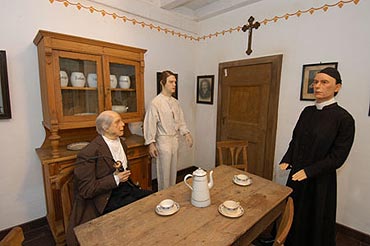Schrift: größer/kleiner
Inhaltsverzeichnis
Sie sind hier: WirRheinländer > english version > The Exhibition > Scenes > House 34 Kolping
House 34 Kolping – industrial worker's flat – around 1880

From the mid-19th century the churches intervened against the deplorable social circumstances. "The Question of Labour and Christianity", written by the Bishop of Mainz, Wilhelm Emanuel von Ketteler, set a new direction. In accordance with Christian values welfare of the poor was actively provided. Thus the Catholic workers' associations under Adolf Kolping were set up in the Rhineland to assist people to help themselves. From 1860 onwardds the Catholic Church demanded that the state and society should pursue a concrete, active social policy. The political catholicism which originated here led to the founding of the Centre Party a few years later. The number of members in the Catholic Rhineland was significant in comparison with the associations of the socialist movement, although in Germany nationwide it was much lower. Based on the General German Workers' Society, the socialists formed the Social Democratic Party of Germany in 1891. Trade unions also developed and their importance continued to grow from 1890.
In their Erfurt Programme of 1891 the SPD demanded with regard to the workers:
"Effective national and international legislation for the protection of workers; to set the normal working day at a maximum of eight hours; to forbid gainful employment of children under fourteen years; to give each worker an uninterrupted break of 36 hours every week; wide-ranging hygienic conditions in industry."
(Marxists' Internet Archive)


